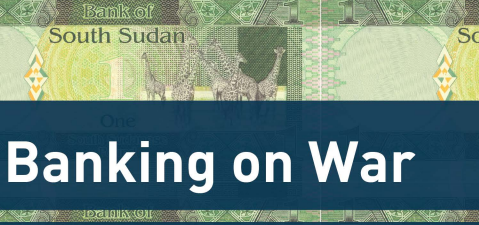A set of banks has been hijacked for the personal benefit of leaders and powerful officials in South Sudan, according to a report released by an anti-corruption watchdog on Wednesday.
The new report by the US group Sentry exposes pervasive risks and political control in the banking sector of South Sudan that have further undermined the country’s economy during years of war.
The investigation found more than half the 26 banks operating in South Sudan, a total of 14 banks, are partially owned or controlled by powerful South Sudanese elites, suggesting an undue level of political influence in the banking sector.
It stated that a mix of local banks, joint banks co-owned with East African investors, and foreign banks operate in the war-torn market but offer few banking services.
These banks, the report said, receive preferential access to foreign exchange because Politically Exposed Persons (PEPs) establish and control banks, either directly or through relatives and associates.
The report stated that this corrupt practice has caused inflation as powerful elites have moved hard currency out of the South Sudanese economy.
The group pointed out that South Sudanese banks operating within East Africa’s banking network have access to the global financial market through correspondent bank relationships, adding many of the powerful political elites who are driving the war rely on correspondent banks in the region and in banking capitals around the world to move money, including US dollars.
It further said regulatory, reputational, political, and money laundering risks in South Sudan’s PEP-influenced banking sector could lead South Sudanese banks—and potentially other East African banks—to lose connections to the global financial system and decrease economic opportunity for millions of South Sudanese.
The Sentry recommended that correspondent banks and regulators should agree to remove the most politically influenced local banks from the global financial system to prevent large-scale de-risking and restore international confidence in the banking sector.
“To lower the chances of heavy-handed de-risking, a regulatory strategy pinpointing how South Sudanese PEPs and their relatives infiltrate East Africa’s banking sector could kick off transparency and bank reforms. A risk-based strategy could home in on specific individuals, rather than focusing simply on the size of transactions,” the report said.
To support necessary reforms, the report said, a partnership between international banks and those pressing for peace and good governance could align the goals of facilitating peace and improving the banking sector in East Africa.
It further said a new economy must be assembled in South Sudan to ensure that local banks are the apolitical engines of growth instead of vehicles of corruption.
Mark Ferullo, Investigative Analyst at The Sentry and report author, said: “When you pull back the curtain on who controls banks in South Sudan, what is revealed is a powerful political network that control portions of South Sudan’s banking sector. Banks should be apolitical engines of growth for the economy, not lucrative businesses for a segment of political elites. For international donors engaging with South Sudan’s transitional government and looking to support the peace deal, anti-corruption reforms of the banking sector should be front and center.”
John Prendergast, Co-Founder of The Sentry and Founding Director of the Enough Project, said: “With access to the global financial system, violent kleptocrats in South Sudan are sending the proceeds of their mass corruption out of the country. For peace to have a chance in South Sudan, the incentives must shift away from looting and towards transparent governance. The United States, European Union, South Sudan’s neighbors, and global banks have the leverage to stop the outflow of corrupt money. By following the illicit money, international regulators and bankers can target the banks in South Sudan that have helped to facilitate money laundering. Preventing kleptocrats’ access to the global financial system will provide the international community with real leverage in support of peace, human rights, and responsible governance.”
Meanwhile Joshua White, Director of Policy and Analysis at The Sentry, said: "This report shows how financial institutions around the world are at the front lines of the battle against the bankrupting of South Sudan by the country's elites. Banks must work closely with regulators and civil society to stem the flow of illicit proceeds out of conflict zones and prevent the laundering of ill-gotten gains through the international financial system. It's absolutely vital for sanctions and anti-money laundering compliance experts in financial centers such as New York, Nairobi, London, and Dubai to understand how these risks affect their institutions and undertake enhanced due diligence to insulate themselves from exploitation."
Since December 2013, South Sudan has fought a civil war that has devastated the country. On 12 September, the government led by President Salva Kiir and opposition groups signed a peace deal to revitalize the unimplemented 2015 peace accord.




